
The Ultimate Guide to Mindful Parenting
Parenting toddlers and preschoolers in today’s fast-paced world comes with its own unique set of challenges and opportunities. In the whirlwind of daily routines, it’s easy to overlook the subtle but important moments that shape a child’s development. These early years are not just about hitting milestones—they are a critical time for laying the emotional and cognitive foundations that will support lifelong learning and resilience.
Raising Kind and Confident Kids
Mindful parenting, which encourages connection, empathy, and intentional engagement, has never been more important. By slowing down and being present with your child, you can promote confidence, kindness, and a love for learning that will serve them well beyond their early years. This guide will walk you through key strategies and practical tips for raising kind, confident, and emotionally resilient children while making the most of your time together.
Building Strong Foundations: Relationship and Reflection
Building a strong foundation in mindful parenting starts with understanding the power of connection and self-reflection. By developing a nurturing environment and being mindful of our behaviours, we can create a secure space for children to grow emotionally and cognitively.
Developing Strong Parent-Child Relationships
At the heart of effective parenting is a strong, supportive relationship with your child. Purposeful bonding time is key—it’s not just about being present, but about being intentionally engaged in activities that promote connection and growth. Consistent, loving interactions create a secure attachment, helping your child feel valued and understood.
Parent Tip: Set aside daily time for activities like reading, playing simple games, or exploring sensory play. For example, exploring textures with sensory bags or counting objects during a walk not only strengthens your bond but also integrates early literacy, numeracy, and memory skills.
Self-Awareness and Reflection
Reflecting on your own behaviours and parenting styles is crucial. Understanding your triggers and responses helps you meet your child’s needs more effectively. This self-awareness leads to intentional parenting, where your actions are guided by thoughtfulness rather than impulse.
Parent Tip: Take a moment to breathe deeply before responding to challenging behaviour. This helps model emotional regulation for your child and creates a more nurturing and supportive environment.
The Bridge Between Emotional Intelligence (EQ) and Cognitive Development (IQ)
While emotional intelligence (EQ) lays the groundwork for a child’s social and emotional development, it also plays a crucial role in cognitive growth (IQ). When children feel emotionally secure and understood, they are more open to learning, exploring new concepts, and embracing challenges. This connection between EQ and IQ is strengthened through mindful parenting—by being fully present and engaged with your child, you not only nurture their heart but also open their mind to deeper learning.
Creating a Supportive Learning Environment
Children thrive in environments where they feel both emotionally supported and intellectually stimulated. Learning isn’t just about academics—it’s about building life skills. When parents are present, engaged, and nurturing, children feel more confident to explore numeracy, literacy, and problem-solving as essential foundations, not just subjects. As they master these skills, they also gain the confidence to take on new challenges.
Parent Tip: Use storytelling as an opportunity to engage both the heart and mind – encourage your child to express emotions through the characters while also developing vocabulary and comprehension. Simple activities like memory games or counting objects during daily routines reinforce critical thinking and numeracy, laying a foundation for future success. Set up cozy spaces for reading, and integrate interesting visual aids like flashcards, making learning an enjoyable and confidence-boosting experience.
Emotional Regulation and Problem-Solving Skills
When children learn to manage their emotions, they also develop better problem-solving skills. Activities that combine cognitive challenges with emotional engagement help children navigate frustrations and think critically, developing both resilience and adaptability.
Parent Tip: Introduce sensory-based problem-solving games, such as finding hidden objects in a sensory bin while following clues, to promote focus and calmness. Critical thinking activities, like simple logic puzzles, or age-appropriate mazes help children learn to pause, think through their options, and regulate their emotions when faced with a challenge.
Practical Ideas to Integrate EQ and IQ Development at Home
To promote the integration of emotional and cognitive skills, parents can incorporate activities that balance both:
Building Vocabulary Through Storytime
Reading together is not only a literacy exercise but also a bonding activity that encourages emotional expression and comprehension.
Parent Tip: After reading a story, ask open-ended questions like, “What would you do in that situation?” to connect emotional understanding with cognitive skills. Use flashcards related to the story’s theme to reinforce vocabulary, new concepts, and memory retention.
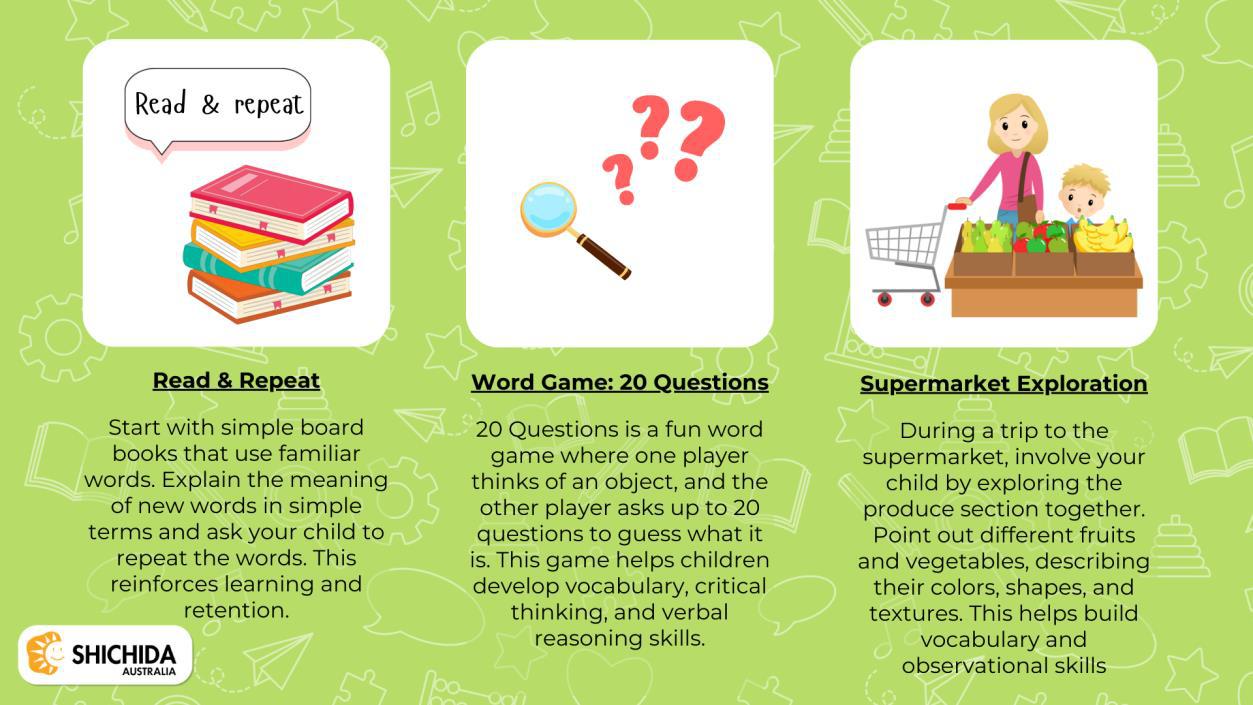
Build your child’s emotional and cognitive skills by expanding their vocabulary in engaging ways.
Counting Games
Make counting a fun part of daily life to build numeracy skills. Introduce your child to an abacus and encourage them to practice flicking the beads in a controlled manner, counting each bead as they move it. This not only reinforces the concept of amounts but also helps develop fine motor control and cultivates a love for counting!
Parent Tip: Count steps as you go up and down, count objects like toys or fruits during snack time, or count the number of red cars on a walk. This integrates learning into everyday activities and helps children develop confidence in their mathematical abilities.
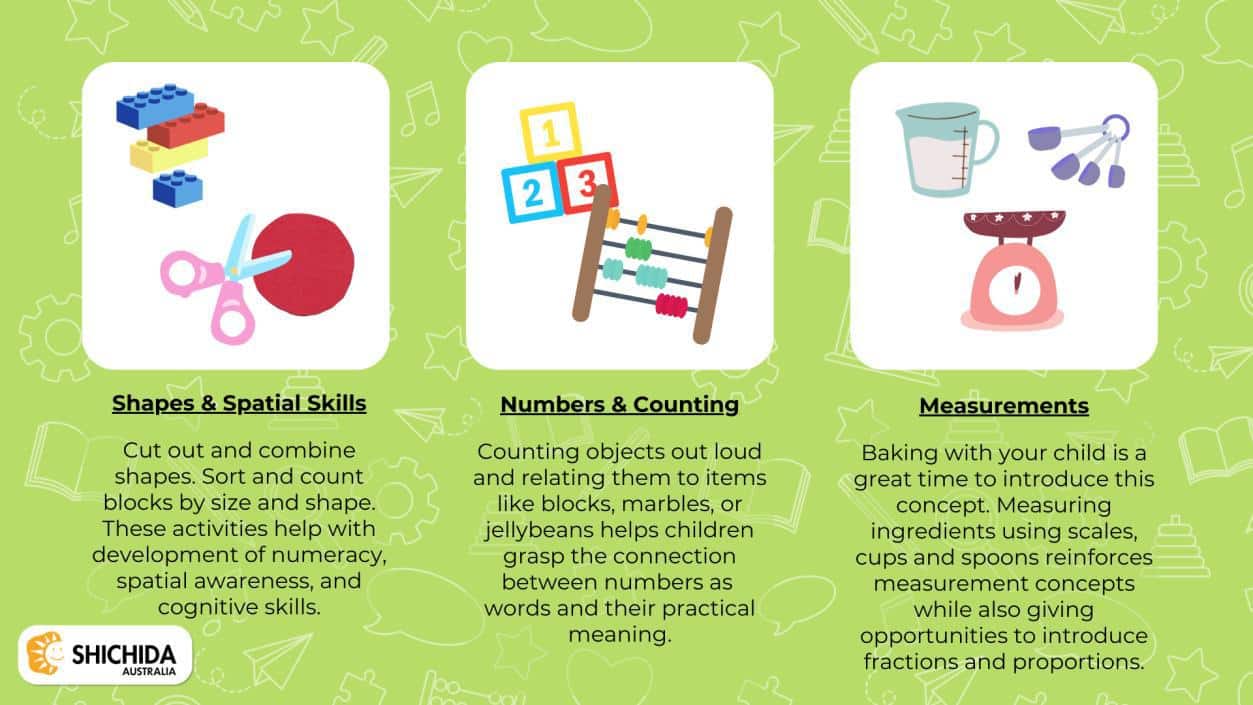
Explore early numeracy skills through fun, hands-on activities that help build a strong foundation for confident problem-solving and cognitive development.
Create a Sensory Station
Set up a small area with different textures and objects for sensory play. You can also include various scents by adding natural elements like flowers, such as lavender, to engage the sense of smell. This multi-sensory approach encourages children to explore and describe what they feel, see, and smell, promoting both sensory and language development.
Parent Tip: Encourage children to describe what they feel or create stories around the objects, promoting both sensory and language development. Sensory activities, such as playing with sand, water, or textured balls, help with emotional regulation and concentration.
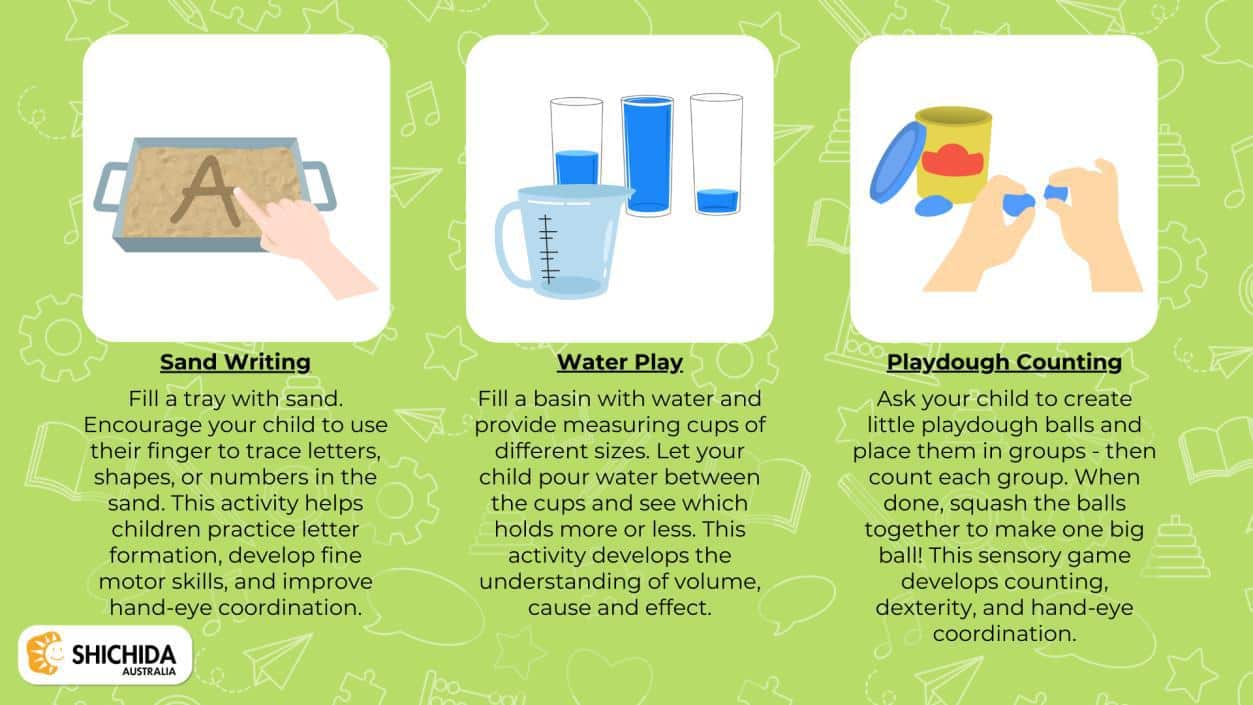
Sensory-based learning activities promote creativity, motor skills, and cognitive development.
Fine Motor Fun
Engage in activities like beading, drawing, cutting, pasting, or simple crafts that develop fine motor skills.
Parent Tip: Create a ‘craft corner’ with materials that encourage creativity and focus. Fine motor activities, such as threading beads or using safety scissors, enhance dexterity and build patience and perseverance. Allow your child to tear and cut paper, glue and fold, and even crumple different textured papers—encouraging them to notice the sounds it makes when tearing and crumpling. Peeling and sticking down stickers is also great for refining finger movement practice.
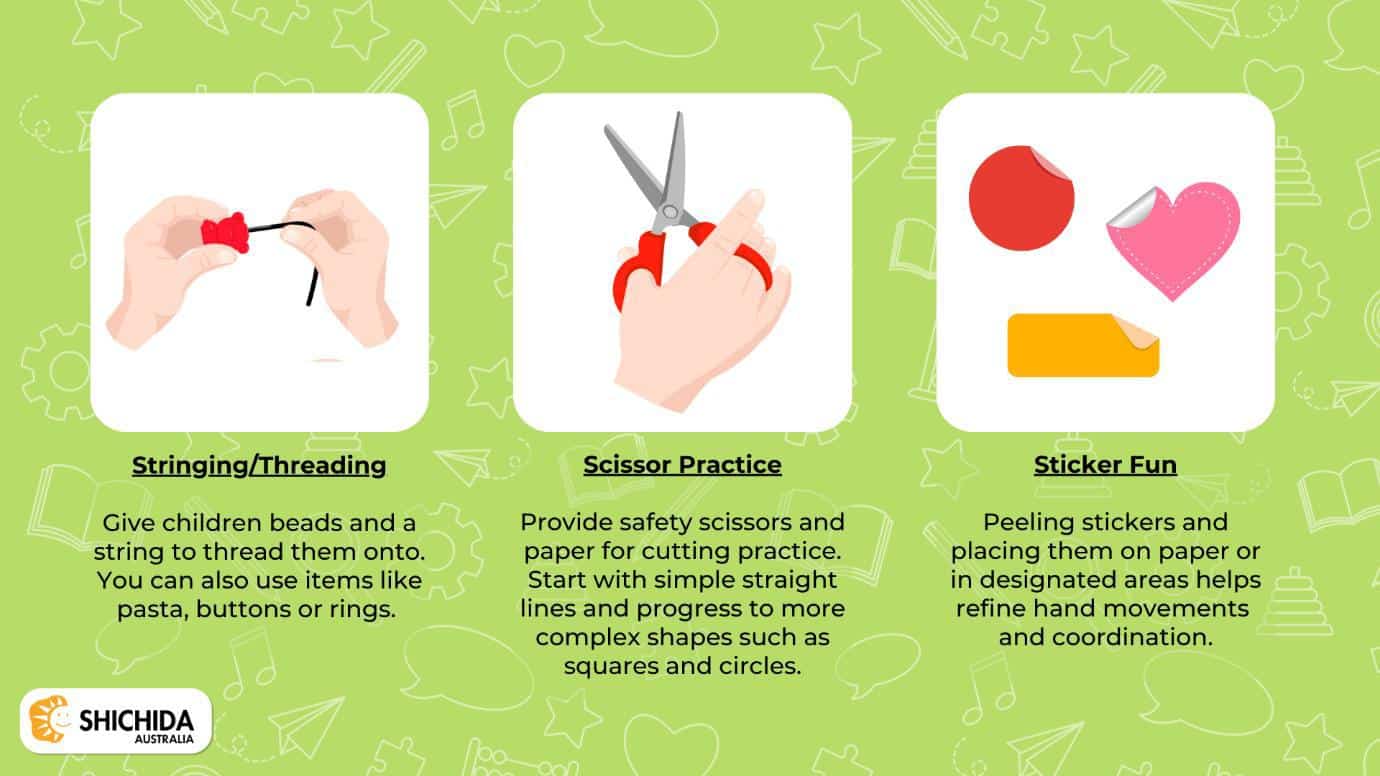
Enhance fine motor skills with fun activities like stringing beads, using safety scissors, and peeling stickers—great for building hand coordination and dexterity!
Memory and Matching Games
Use matching games or simple memory cards to develop cognitive skills. Memory is crucial for a child’s learning process as it helps them retain and recall information, while building a foundation for reading, math, and problem-solving skills.
Parent Tip: Turn everyday objects into a fun memory game! Lay out a few household items, let your child study them, and then cover them up. Remove one item and see if your child can remember which one is missing. You can gradually increase the number of items for an extra challenge. This game helps improve concentration, memory, and observation skills in a playful and easy-to-set-up way.
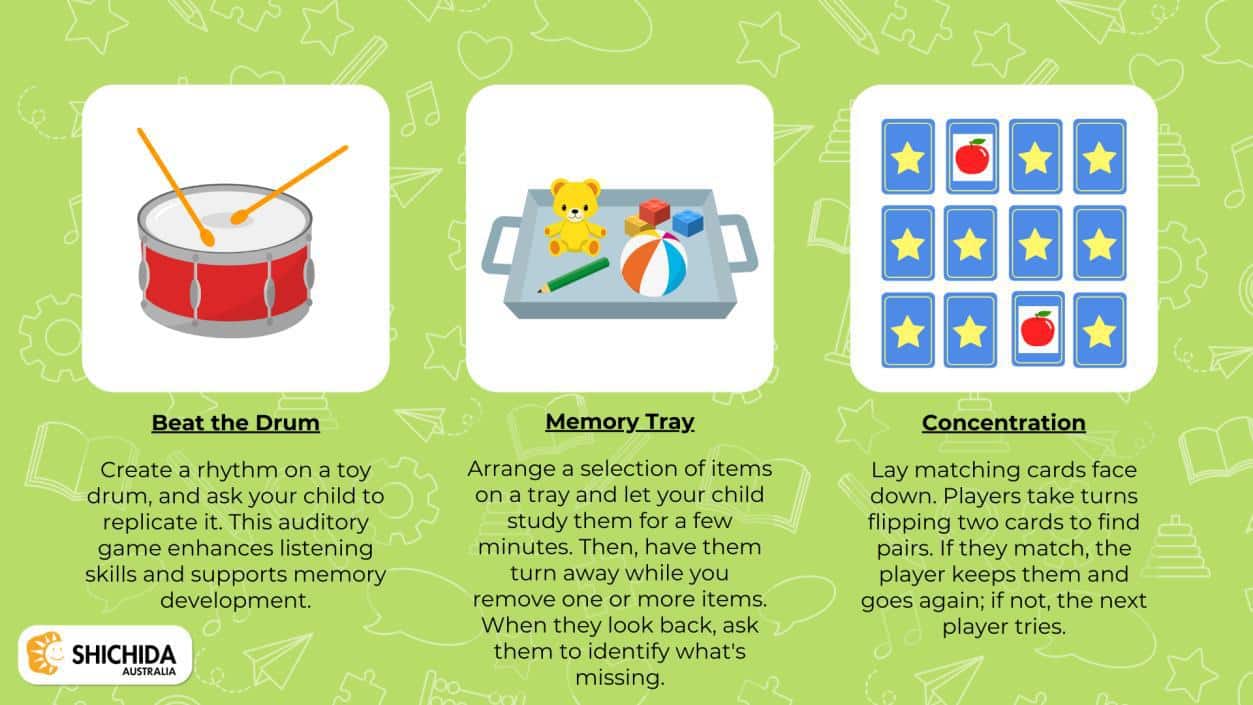
Strengthen your child’s memory with engaging memory games. These fun activities enhance listening, recall, and cognitive skills while spending meaningful time together.
Guiding Behaviour: Boundaries and Autonomy
Finding the right balance between setting boundaries and encouraging autonomy is key to guiding a child’s behaviour. While boundaries provide a sense of security and structure, allowing autonomy helps children develop confidence and decision-making skills.
Setting Clear Boundaries with Empathy
Clear and consistent boundaries provide structure and safety for children, offering them a sense of security in knowing what is expected. Establishing rules that are fair and age-appropriate not only helps guide their behaviour but also builds trust. When boundaries are communicated with empathy, children feel understood and respected, which can reduce power struggles and improve cooperation.
Parent Tip: Create predictable routines, such as tidying up toys after playtime or having a set time for quiet reading. These routines reinforce boundaries while giving children a sense of control over their environment. Empathy is key—when your child resists a boundary, acknowledge their feelings first before gently reinforcing the limit. For example, “I know it’s hard to stop playing, but it’s time to clean up now. Let’s do it together!” This way, you maintain the necessary structure while supporting their emotional needs.
Encouraging Autonomy and Confidence
Giving children a sense of control over their lives helps them develop independence, resilience, and self-confidence. When children are allowed to make age-appropriate choices and decisions, they learn to trust their judgment and feel empowered. This process of building autonomy encourages problem-solving and critical thinking, which are essential skills for future success.
Parent Tip: Allow children to make simple choices, such as picking out their clothes, choosing their snack, or deciding which book to read before bed. Offering limited, structured choices—”Would you like to wear the blue shirt or the red one?”—gives them a sense of control without overwhelming them. Celebrate their decision-making by acknowledging their choices positively: “Great job picking out your outfit! You made a thoughtful choice.” Additionally, encourage children to take on small tasks like helping set the table or putting away their toys. These activities build confidence, showing them that their contributions are valued and that they are capable of handling responsibility.
Mindful Parenting: Empathy, Connection, and Skill Integration
Mindful parenting is about being fully present and engaged with your child, developing empathy, and creating meaningful connections. By integrating emotional understanding with practical skills, parents can support their child’s holistic development.
Practicing Mindful Parenting in Daily Routines
Mindfulness in parenting means being present and fully engaged with your child. It involves listening actively and responding thoughtfully rather than reacting impulsively.
Parent Tip: Implement a mindful morning routine with your child, including stretching, singing, or a short, calming activity. This helps create a calm and cooperative family dynamic, integrating learning activities seamlessly into daily life.
Empathy and Connection
Empathy is a powerful tool in parenting. Understanding and validating your child’s emotions strengthens your bond and provides emotional security.
Parent Tip: Acknowledge a child’s frustration over a challenging puzzle and encourage them to keep trying, reinforcing perseverance and emotional resilience.
Integrating Key Skills for Holistic Development
Implement learning strategies that nurture both emotional and cognitive growth. Emotional skills are just as important as cognitive abilities, and rather than focusing on them separately, you can integrate these areas into activities that engage both the heart and the mind. By combining logical thinking with emotional awareness, children learn to manage their feelings and behaviours more effectively while also developing essential cognitive skills, laying the foundation for future success.
Parent Tip: Use collaborative problem-solving games that require both emotional engagement and cognitive skills. For instance, play a cooperative building game with blocks or LEGO where you and your child create a structure together. Along the way, encourage your child to express their feelings about the progress: “How does it feel when the block doesn’t fit? How can we solve this?” By discussing emotions like frustration or excitement while solving the problem, you’re helping your child learn to regulate their feelings in challenging situations. At the same time, they’re developing spatial awareness, planning, and critical thinking as they figure out how to complete the structure. This holistic activity promotes both emotional resilience and cognitive growth.
Mindful Parenting: A Journey of Growth
Parenting is a dynamic and evolving journey that requires patience, reflection, and continuous learning. By building strong relationships, practising self-awareness, setting clear boundaries, encouraging autonomy, and integrating both emotional and cognitive development, you can raise kind, confident, and emotionally resilient children. These principles not only nurture your child’s growth but also deepen the parent-child bond, creating a loving and supportive family environment where your child can thrive.
For parents seeking a more comprehensive approach to developing both emotional and cognitive development, there are exceptional resources and programs available. These offerings go beyond traditional methods, providing one-of-a-kind experiences that align with your values and create enriching learning environments for your child. Whether it’s through tailored activities or age-specific classes, these resources can help you integrate mindful parenting into your daily life in meaningful ways.


